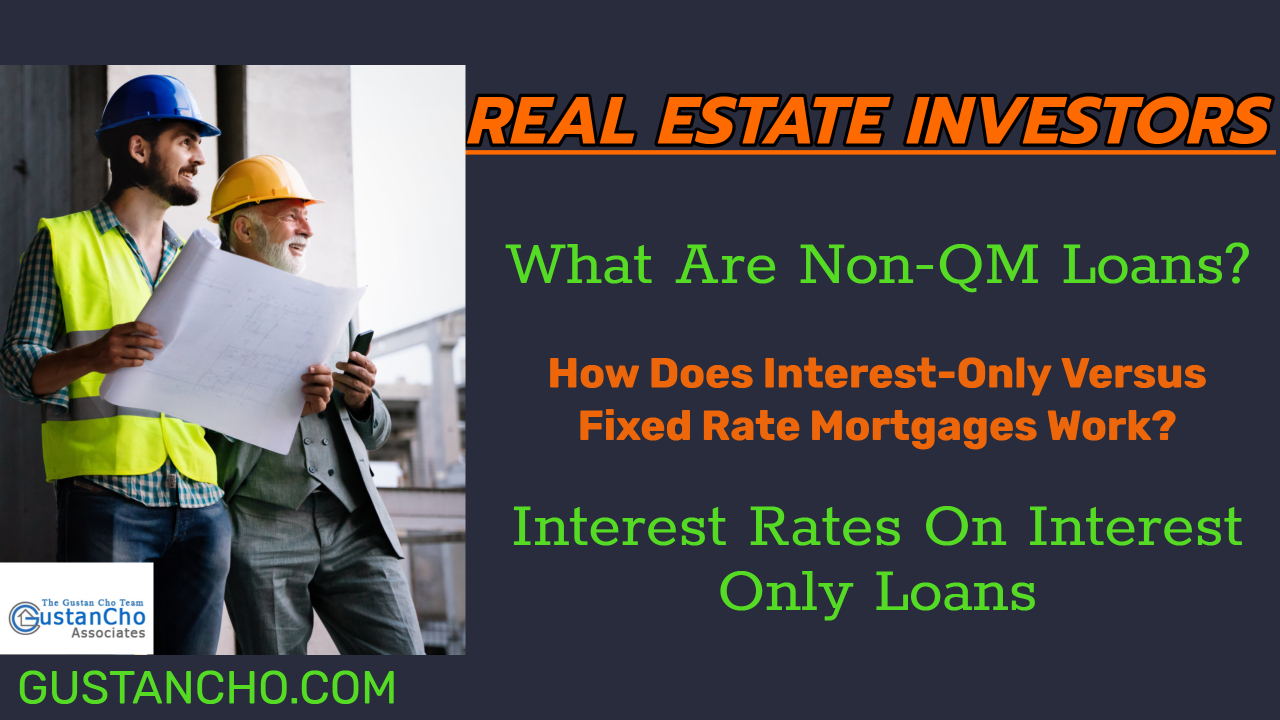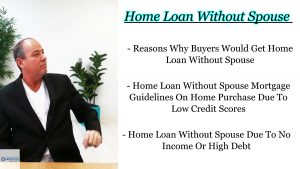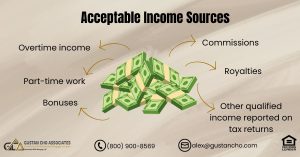This BLOG On Interest Only Mortgages With NON-QM Loans Versus Amortized Was UPDATED And PUBLISHED On March 11th, 2020

Traditional mortgages require that borrowers pay back the money borrowed in the form of principal plus interest.
- Most homeowners dreams are to have their homes clear of any mortgages and have it free and clear
- Most government and conventional loan programs have fully amortized loans
- The most popular home loans today are 30 year fixed rate mortgages
- With fully amortized 30 year fixed rate mortgages, homeowners who make monthly principal and interest payments will have their home loan balance paid off in 30 years
- There are interest-only mortgages that benefit short term homeowners or real estate investors on commercial properties
In this article, we will discuss and cover Interest Only Mortgages With NON-QM Loans Versus Amortized.
What Are Non-QM Loans
Gustan Cho Associates Mortgage Group are experts on non-QM loans and bank statement loans for self-employed borrowers. Both of these loan programs have interest-only mortgage loans. Many borrowers of non-QM and bank statement loans for self-employed borrowers choose interest-only versus fixed-rate mortgages due to the lower monthly payment and because they plan on refinancing sooner than later.
- NON-QM Loans are non-traditional loans often used as bridge loans
- There is no waiting period after housing event and/or bankruptcy with non-QM loans
- Many property owners who have less than perfect credit often don’t want to lose out in a rising housing market and purchase a home with non-QM loans
- They often choose interest-only mortgages due to the lower interest rates and lower monthly payment
- When they button up their credit and income profile, they finance with traditional government and/or conventional loans
- Bank Statement Loans for self-employed borrowers require 24 months of bank statements
- 24 months bank statement deposits are averaged and that will be the borrowers’ monthly income
- Not income tax returns are required
- 10% to 20% down payment is required
Down payment requirements depends on the borrowers’ credit scores.
How Does Interest-Only Versus Fixed Rate Mortgages Work

Interest Only Mortgage best benefits for those who are using this type of loan either as a bridge loan or plan on refinancing this loan to a permanent end loan in the near future.
- Fully amortized loans get paid once the term of the loan is over
- As monthly payments get paid, a portion of the monthly mortgage payments goes to pay down the principal
- As a result of these payments, the principal decreases over the term of the loan
- At the opposite end of the spectrum are interest-only mortgages
- Interest-only mortgages allow borrowers to pay only the interest accruing on the loan
- The principal remains the same
- Borrowers only pay interest payments only
So if borrower borrowers $200,000 and makes timely payments for five years, the balance at the end of five years will still be $200,000.
Payments On Interest Only Mortgages
An interest-only mortgage is a mortgage loan program where the interest-only is paid. The principal of the loan balance remains the same.
- The payment that is required on interest-only mortgages consists of only the interest for a specified period of the time
- Terms are normally five years, seven years, or ten years
- At the end of that specified time period, the mortgage loan balance remains the same and is not changed
- When the period of the fixed term of the mortgage expires, the loan will re-amortized and both the principal and the interest of the mortgage loan are due
At that time, the loan is normally refinanced or a new mortgage loan can be undertaken.
Basics Of Interest Only Mortgages

Under an interest-only mortgage, a borrower may choose to pay more than only the interest. By doing so they have the additional money applied toward the principal.
- In fact, a borrower could choose to make the fully amortizing payment each month
- The borrower can choose to retire the loan as though it had been structured as a traditional amortized principal and interest term loan
In order for borrowers to pay back the mortgage loan balance of an interest-only mortgage, borrowers need to pay a fully amortized monthly payment and NOT just the interest-only
Interest Rates On Interest Only Loans
The interest rate on an interest-only mortgage is typically very lower than 30 year fixed rate mortgages.
Most interest-only mortgages are not issued by residential mortgage lenders. Interest-only loans are ideal for borrowers who are using it as a bridge loan. Commercial and portfolio mortgage lenders are lenders often offer interest-only loans. It is ideal for builders and property developers where they pay interest only on a project and once the project is complete, they either sell it or refinance it to a term loan. Most builders and commercial real estate developers use interest-only mortgages. We offer interest-only home loans on non-QM and bank statement mortgage loans for self-employed borrowers. Interest-only home loans are only recommended for short term real estate investors or homeowners who are using it as a temporary bridge loan until their credit and finances qualify them for traditional mortgages.







